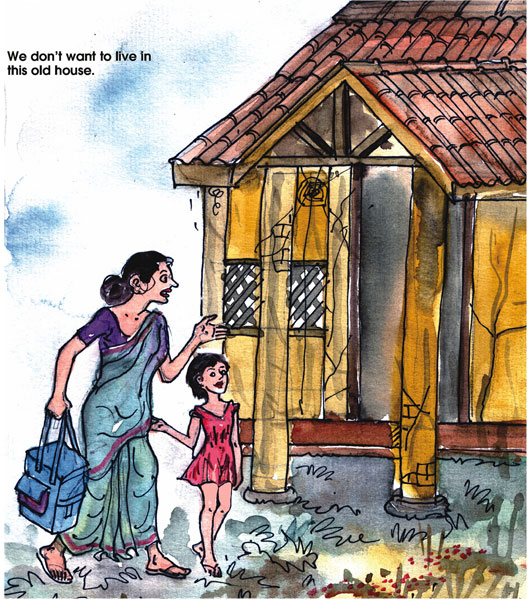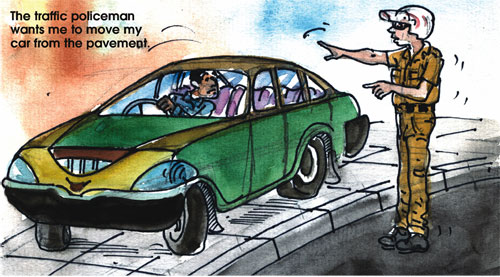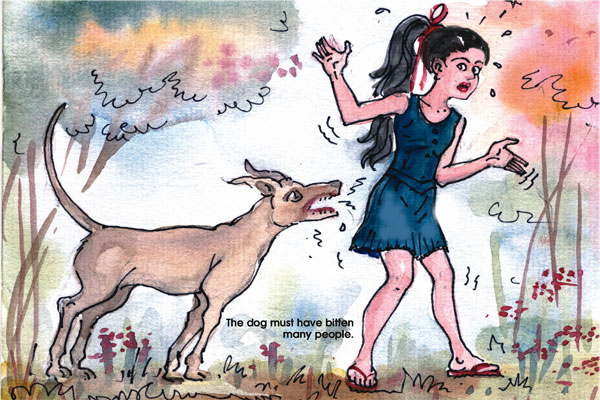|

by R. S. Karunaratne
Verb + infinitive
After some verbs we can use an infinitive with ‘to.’
I hope to go to London later this month.
My parents agreed to help a poor student in my class.

Some people refuse to take medicine.
His employer promised to give him a promotion.
I expected to meet my friend at the airport, but he was not there.
Sam decided to look for another job.
We don’t want to live in this old house.
She is learning to swim in three days.
Father is planning to take driving lessons.
I have to be in office at 8.30 a.m.
I began to learn music when I was six.
After ‘begin, start, continue’ and ‘prefer’ we can use ‘-ing’ forms.
When did you begin learning shorthand?
She started having headaches after returning from abroad.
The minister continued speaking for another half an hour.
Some people start living in the city as there are no modern
facilities in villages.
Verb + object + infinitive
I want somebody to clean the garden.
I’d like you to listen to me.
She wants me to edit her book.
Sam would like his sister to cook tonight.
The traffic policeman wants me to move my car from the pavement.
Parents want their children to pass all examinations.
I’d like you to help me financially.
I want you to be quiet for a few minutes.
The opposition would like the government to allocate more funds for
education.
Adjective + infinitive
We use adjectives such as ‘clever, crazy, right, silly, stupid’ and
‘wrong’ + infinitive to say what we think of.
You’re crazy to criticise what people write in newspapers.
You’re stupid to carry all your money in one bag.
She was clever to come to the office in time.
She is silly to listen to his talk all the time.
I was stupid to leave my glasses at home.
You are right to eat a balanced diet.
We can use infinitives with ‘to’ after adjectives for feelings.
I am glad to find you at home.
We’re pleased to meet you.

I was glad to leave Malaysia before the plane disaster.
I was sorry to say goodbye to my friends.
She was pleased to find friendly people in India.
Adjectives with ‘enough’ or ‘too’ + infinitive.
You’re old enough to apply for a driving licence.
Nethmi is not old enough to drive.
Sam is old enough to leave school.
Are you old enough to change your name?
This is too cold to drink.
The shirt is too big to wear.
This parcel is too heavy to lift.
The novel is too boring to read.
Some creatures are too small to see.
Match words and meanings
Here’s an exciting way to enrich your vocabulary. Match words in
Column ‘A’ with their meanings in Column ‘B’ and check your answers with
the key. The first has been done for you.
[Column A]
N 1. clarinet
... 2. clarity
... 3. clash
... 4. clasp
... 5. classic
... 6. classicist
... 7. classify
... 8. classy
... 9. claustrophobia
... 10. clean-cut
... 11. cleanliness
... 12. cleanse
... 13. cleft
... 14. clemency
... 15. clench
... 16. cleric
... 17. client
... 18. clientele
... 19. climate
... 20. climatic
... 21. climatology
... 22. climax
... 23. climber
... 24. cling
... 25. clink
[Column B]
A. having a high quality
B. the general weather conditions
C. one who studies Greek and Roman culture
D. a customer
E. to hold somebody firmly
F. a priest
G. kindness when giving a punishment
H. tidy in appearance
I. to divide things into groups
J. the quality of being clear
K. all the customers of a business
L. to fight or argue
M. a crack in a rock
N. a tube-shaped musical instrument
O. to make a short ringing sound
P. to hold something tightly
Q. one who climbs mountains
R. the most important point in a story
S. the scientific study of weather conditions
T. relating to weather conditions
U. to hold something tightly
V. to make some thing completely clean
W. the state of being clean
X. fear of being in closed places
Y. stylish or Fashionable
Key:
2. J 3. L 4. E 5. A 6. C 7. I 8. Y 9. X 10. H 11. W 12. V 13. M 14. G
15. U 16. F 17. D 18. K 19. B 20. T 21. S 22. R 23. Q 24. P 25. O
Starters:
‘May have’, ‘could have’ and ‘must have’
‘May, could’ and ‘must’ are modal verbs. We use them with the perfect
‘have + a past participle to talk about possible past events.
‘May / might’ + have + past participle
She may have got a job in Australia.
>Bhadri may have got lost in California.
Sam may have stolen my pen.
You may have seen my new car.

The principal may have warned the students after the incident.
He might have forgotten to post the letter.
You might have missed the 7.30 train.
Lal might have come by bus.
Sena might have taken my dictionary.
Vindhya might have left the country.
If something did not happen in the past, we use ‘may / might + not +
have + past participle of the verb.
Shyma might not have answered all the questions.
Willie may not have done his homework.
The teacher might not have brought your book.
You may not have read The Tempest.
The driver might not have seen the red light.
The child may not have done his homework.
They might not have come from Russia.
The book may not have been proofread properly.
The doctor might not have seen my blood report.
The nurse may not have given the prescribed medicine to the patient.
Could + have + past participle
You could have passed the test easily.
We could have joined the army when we were young.
She could have been a good dancer.
He could have climbed the mountain.
The mechanic could have repaired my car.
Is something possibly did not happen in the past, we use ‘could + not
+ have + past participle of the verb.’
Such an accident could not have happened in that small island.
He could not have passed the examination.
Bala could not have won the prize.
Doreen could not have come by train.
Susila could not have done her homework.
‘Must + have + past participle
Well, something must have delayed him.
He must have been arrested by the police.
She must have slept too long.
The workers must have gone on leave.
The dog must have bitten many people.
We use ‘should have’ or ‘ought to have’ when somebody did not do the
right thing.
You should have applied for the post of registrar.
I ought to have drawn your face first.
She should have stayed for a little longer.
He ought to have sat the examination again.
We should have gone with them.
Quiz on idioms
An idiom is a special kind of phrase. It is a group of words which
have a different meaning when used together from the one it would have
if the meaning of each word were taken individually. Tick the meaning of
each idiom in bold type and check your answers with the key.
1. If a part of your body is black and blue ...
(a) it is badly bruised
(b) it is painted in black and blue
(c) it is lifeless
2. If you want something in black and white ...
(a) you want it typed
(b) you want it printed
(c) you want it in writing
3. If an organisation is in the black ...
(a) it is indebted to banks
(b) it does not owe anyone any money
(c) it is flourishing
4. If you describe somebody as a wet blanket ...
(a) they spoil other people's fun
(b) they join other people's fun
(c) they are independent
5. If you say that somebody is as blind as a bat ...
(a) they are colour blind
(b) they cannot see well
(c) they can see very well
6. If a piece of machinery is on the blink ...
(a) it is very expensive
(b) it is working properly
(c) it is not working properly
7. If something is put on the block ...
(a) it is offered for sale at an auction
(b) it is sold
(c) it is cheap
8. If somebody put their neck on the block ...
(a) they are scared of death
(b) they are ready to die
(c) they risk their reputation by taking a course of action
9. A stumbling block ...
(a) is a barricade
(b) is a problem that stops you from achieving something
(c) is something you never expected
10. If somebody is after your blood ...
(a) they want to harm you
(b) they want to praise you
(c) they want you to donate blood
Key:
1. (a) 2. (c) 3. (b) 4. (a) 5. (b) 6. (c) 7. (a) 8. (c) 9. (b) 10.
(a) |

